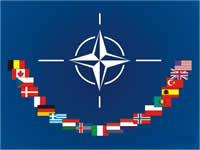 The budget cuts experienced by much of the Western world are predominantly viewed through the prism of job loss, shrinking pensions, and healthcare cuts. While these concerns are absolutely legitimate, the public as a whole – as opposed to a narrow group of politicians and policy experts – has not concerned itself much with the effect of austerity on the transatlantic relationship. However, it is the support of the voter that ultimately will maintain the viability of the quintessential transatlantic institution, NATO. Indeed, one of the Atlantic Alliances’ greatest security challenges is to convince the public that investment in defense is worthwhile.
The budget cuts experienced by much of the Western world are predominantly viewed through the prism of job loss, shrinking pensions, and healthcare cuts. While these concerns are absolutely legitimate, the public as a whole – as opposed to a narrow group of politicians and policy experts – has not concerned itself much with the effect of austerity on the transatlantic relationship. However, it is the support of the voter that ultimately will maintain the viability of the quintessential transatlantic institution, NATO. Indeed, one of the Atlantic Alliances’ greatest security challenges is to convince the public that investment in defense is worthwhile.
The lack of public interest in transatlantic defense cooperation is particularly disconcerting in light of the eastward shift in power. As the world becomes increasingly multi-polar, the ability of Europe and North America to caucus in security matters has become all the more necessary. Instead, national defense obligations are viewed as an unnecessary burden rather than the prerequisite for a stable, prosperous world conducive to the spread of democratic values.
In this cash-strapped era, it is the job of leaders, experts, and opinion makers to take the case to the public, that maintaining and spreading core transatlantic values is both a moral imperative and a matter of national security. In an age of austerity, these goals are only attainable through a pooling of resources and a coordination of efforts. Under these circumstances, it would be a mistake to weaken the ability to act collectively through NATO.
While shared values are the foundation of the transatlantic relationship, common institutions are the superstructure of this value-based community – NATO above all. Lest it be forgotten, institutions are the tools with which values are maintained and interests protected. Presently, the transatlantic community’s capability to translate values into concrete policy is declining concurrently with NATO’s assets. Some might contradict and point to Libya, but although a nominal success, Libya also demonstrated the severe limitations of European capabilities, and the unwillingness of the U.S. to take the lead in politically and economically costly missions.
The case for defense is not an easy one, particularly on the tail end of the not overwhelmingly positive experiences in Iraq and Afghanistan. Yet cutting back on defense is not only a question of bombs and bullets. Diminished investment in military assets translates directly into a diminished political investment in NATO as a vehicle of diplomacy.
Skeptics must be reminded that NATO historically has proven itself as an organization with an important role to play as a coordinator of diplomatic efforts. Take, for example, NATO’s 1967 adoption of the Harmel Doctrine, which stipulated that the Alliance had a political role to play alongside its military one. This doctrine furthered détente with the Eastern Bloc and was an important step toward the Helsinki Accords, including the much celebrated provision making human rights a matter of legitimate international concern.
It is NATO’s long standing diplomatic role that should be highlighted to a public that has little interest in conflict, but who would agree with the desirability of spreading basic human rights and engaging adversaries from a position of strength. A disinterested public could gut the alliance, stripping its assets, and decreasing NATO’s credibility as a security institution. Member nations might then seek alternative security arrangements, diverging the transatlantic cooperation and leaving it open to exploitation at a time when U.S. and European influence is waning and coherence is needed more than ever.